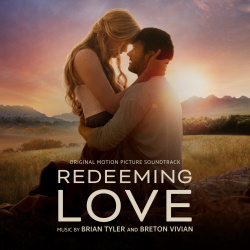REDEEMING LOVE – Brian Tyler, Breton Vivian
 Original Review by Jonathan Broxton
Original Review by Jonathan Broxton
Redeeming Love is a ‘faith-based drama’ directed by D. J. Caruso, based on a popular novel by Francine Rivers, which was itself a re-telling of the biblical story of Hosea, a prophet who married an unfaithful woman. The film is set in the 1850s at the height of the California gold rush and tells the story of Angel, a woman who was sold to a brothel as a child and who has essentially spent her entire life working as a prostitute. Despite her miserable life Angel is positive and optimistic, and her prospects begins to change when she meets and falls in love with Michael, a kind-hearted farmer who ‘rescues’ her following a beating from a client. However, the road to true love and redemption is always fraught with perils, and before long Angel and Michael find themselves dealing with all sorts of trials and tribulations – not only in terms of their circumstances in the present, but also as a result of Angel’s horrific past experiences coming back to haunt them. The film stars Abigail Cowan and Tom Lewis as Angel and Michael, with Famke Janssen, Logan Marshall-Green, and Nina Dobrev in supporting roles, and has an original score by Brian Tyler and Breton Vivian.
Despite all his success in the action genre – where he has scored such mega hits as Iron Man 3, Thor: The Dark World, several Expendables movies, two Rambo movies, two Now You See Me movies, and several entries in the Fast and Furious franchise – I have always been drawn to the more lyrical, romantic, emotional side of Brian Tyler, and Redeeming Love certainly fits those parameters. This is a staggeringly beautiful score, heartfelt and sincere, and for me is probably my favorite purely orchestral drama score that Tyler has written since Partition back in 2007 – and anyone who knows my taste will know how much of a compliment that is. Tyler co-wrote the score with the Anglo-Australian composer Breton Vivian, who has worked with Tyler since 2017 – they scored the hit contemporary western TV series Yellowstone together, as well as its recent historical prequel spinoff 1883.
 The score is anchored around a recurring main theme, the “Redeeming Love Theme,” which acts as the identity for Angel and Michael and underscores their relationship. The theme is sensational. Clearly, considering that the film is driven by the concept of their romance being guided by Michael’s faith in God, Tyler channeled that sense of devotion into his music, resulting in a theme which is perhaps the most poignant depiction of unyielding love that he has ever written – it celebrates both the romantic relationship between the lead characters, but also the love that they have for God, and which He apparently shows them in return, allowing them to endure all manner of hardships on the road to redemption. The theme is written for a full orchestra, recorded in Vienna, but it is anchored by solos performed by the virtuoso violinist Gil Shaham, whose tone and texture simply shines. Tyler considers Shaham to be the greatest living violinist, and when you hear his sound here, you understand why.
The score is anchored around a recurring main theme, the “Redeeming Love Theme,” which acts as the identity for Angel and Michael and underscores their relationship. The theme is sensational. Clearly, considering that the film is driven by the concept of their romance being guided by Michael’s faith in God, Tyler channeled that sense of devotion into his music, resulting in a theme which is perhaps the most poignant depiction of unyielding love that he has ever written – it celebrates both the romantic relationship between the lead characters, but also the love that they have for God, and which He apparently shows them in return, allowing them to endure all manner of hardships on the road to redemption. The theme is written for a full orchestra, recorded in Vienna, but it is anchored by solos performed by the virtuoso violinist Gil Shaham, whose tone and texture simply shines. Tyler considers Shaham to be the greatest living violinist, and when you hear his sound here, you understand why.
The theme begins slowly, quietly, Shaham’s undulating figures against the rich strings of the Viennese ensemble. A recurring thematic idea, based around a five-note flourish, asserts itself, and then just around the 45 second mark a cymbal ring introduces the first of many gorgeous, spine-tingling swells. As the cue continues a solo piano performed by Tyler himself sometimes takes over the main instrumental line, Shaham’s violin textures add color and depth, and it ends with a soaring cascade of emotion that is just superb. Some people have mentioned similarities between parts of the theme and the classical work of Ralph Vaughan-Williams, especially The Lark Ascending, as well as with James Newton Howard’s The Village, and it’s true that there are resemblances on a superficial level, but honestly these kinds of homages bother me less and less the older I get; if the music moves me, in the way that this music did, then everything else is secondary.
Numerous cues throughout the rest of the score are built around statements of, and variations on, the love theme, and many of them are just as beautiful. “The Gift,” “He Loves You,” the bittersweet “Mother,” the rhapsodic “Help Me,” and “More Than I Can Offer” are especially notable in this regard. A secondary theme weaves through cues like “Sunrise,” “Absolutely Nothing,” “I Was Wrong,” and “Providence,” warm and wholesome and softly reverential, and on several occasions Tyler introduces a soft choral element alongside the orchestra, which appears to address some of the more pro-religious aspects of the story. Meanwhile, “Farm Life” and “You” are bucolic and inviting, the musical essence of rural idyll, golden hills and fields of grain. Some of the textures Tyler uses here remind me occasionally of Thomas Newman, especially his pastoral writing at the end of The Shawshank Redemption, and other scores in that vein.
 Juxtaposing this are some darker passages for more somber pianos, prominent cellos, and more muted orchestral colors, as well as metallic percussion, subtle electronics, and sometimes a little more choir. These are used mostly to emphasize the terrible experiences Angel suffers during the course of her life as a prostitute – at various points in the film the story touches on themes of incest, suicide, theft, abortion, child molestation, abandonment, sex trafficking, arson, and much more – and cues like “Far Away,” “Brother Paul,” “The City,” and especially the rather intense and occasionally challenging pair comprising “Angel” and “Unclean” go some way towards illustrating these topics. Life in the old west was hard, especially for a woman. However, even in these darker moments, Tyler’s music remains defiantly tonal and thematic, never dropping into the ease of dissonance or relying on simple drones to underpin the cruelty. Shaham’s violin is ever present too, offering glimmers of hope, and Tyler often allows subtle allusions to the main theme to continue to emerge.
Juxtaposing this are some darker passages for more somber pianos, prominent cellos, and more muted orchestral colors, as well as metallic percussion, subtle electronics, and sometimes a little more choir. These are used mostly to emphasize the terrible experiences Angel suffers during the course of her life as a prostitute – at various points in the film the story touches on themes of incest, suicide, theft, abortion, child molestation, abandonment, sex trafficking, arson, and much more – and cues like “Far Away,” “Brother Paul,” “The City,” and especially the rather intense and occasionally challenging pair comprising “Angel” and “Unclean” go some way towards illustrating these topics. Life in the old west was hard, especially for a woman. However, even in these darker moments, Tyler’s music remains defiantly tonal and thematic, never dropping into the ease of dissonance or relying on simple drones to underpin the cruelty. Shaham’s violin is ever present too, offering glimmers of hope, and Tyler often allows subtle allusions to the main theme to continue to emerge.
One or two cues also offer more a traditional ‘western’ sound, often featuring prominent guitars and jangly Morricone-esque percussion – “California” is an especially fun, upbeat depiction of the hustle and bustle of the Gold Rush era. The whole thing culminates in a sensational 6-minute “End Titles,” which reprises the majority of the score’s thematic ideas. The sweep of the orchestra, and the depth of emotion that comes in the conclusive statement of the main theme at 4:43 simply takes the breath away.
Brian Tyler said that recording this score was one of the most emotional musical experiences of his life, and it’s not difficult to see why that would be the case. Redeeming Love is a truly outstanding score, and as I said earlier is probably the most deeply emotional drama score he has written since Partition, more than 15 years ago. The whole thing overflows with haunting, achingly tender writing for solo violin and orchestra, classical, intimate, and moving; it’s a side to Brian Tyler that doesn’t get to emerge very often, but when it does it reminds us just what a tremendous talent he is. While his Fast & Furious scores and his superhero epics attract more attention, and more fan clicks, it is scores like Redeeming Love that showcases the sensitive, emotional side of Brian Tyler, and I for one love it.
Buy the Redeeming Love soundtrack from the Movie Music UK Store
Track Listing:
- Redeeming Love Theme (5:23)
- The Gift (4:29)
- Sunrise (4:41)
- Far Away (4:11)
- Not the Only One (3:06)
- He Loves You (1:29)
- California (3:24)
- Absolutely Nothing (1:33)
- Brother Paul (1:22)
- What You Are (1:40)
- Mother (1:25)
- The City (2:25)
- Angel (5:57)
- Unclean (1:44)
- No Choice (1:47)
- I Was Wrong (2:08)
- Help Me (2:35)
- Farm Life (1:43)
- You (2:32)
- Providence (2:47)
- More Than I Can Offer (1:20)
- Redeeming Love End Titles (5:56)
Running Time: 63 minutes 28 seconds
Sony Music/Milan Records (2022)
Music composed by Brian Tylerand Breton Vivian. Conducted by Brian Tyler. Performed by the Vienna Symphony Orchestra. Orchestrations by XXXX. Featured musical soloists Gil Shaham and Brian Tyler. Recorded and mixed by Greg Hayes. Edited by Matthew Llewellyn. Album produced by Brian Tyler.


Excellent review! Brian Tyler has been talking about this score for so long, and it certainly lives up to the hype!